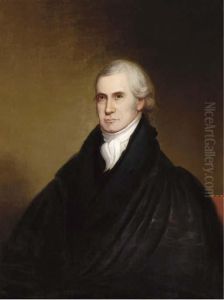John Martin Blennerhassett Paintings
John Martin Blennerhassett, born on October 8, 1772, in Hampshire, England, was not primarily known for his contributions to art but rather for his role in American history, particularly in the early 19th century. He was educated at Trinity College, Dublin, where he cultivated a deep interest in philosophy and the sciences. Despite his early leanings towards academia, Blennerhassett's life took a dramatic turn following his marriage to his niece, Harman Blennerhassett, which led to his disinheritance. Seeking a fresh start, they emigrated to the United States in 1796.
In America, Blennerhassett purchased an island in the Ohio River, near Parkersburg, West Virginia, now known as Blennerhassett Island. There, he built a magnificent mansion that became a symbol of his wealth and social standing. The Blennerhassetts entertained lavishly and were well-regarded by the American elite. However, John's life of leisure and cultural pursuits changed dramatically when he became involved with Aaron Burr, the former Vice President of the United States.
Blennerhassett's island became a base of operations for Burr's mysterious enterprise, which was later revealed to be a plan to establish an independent empire in the southwest, possibly detaching territories from the United States and Spanish-held lands. Blennerhassett provided financial backing and logistical support for this venture, a decision that ultimately led to his downfall. When Burr's scheme was uncovered in 1807, Blennerhassett was arrested and his property seized. Though he was eventually acquitted, his wealth was depleted, and his reputation tarnished.
After the trial, Blennerhassett tried to rebuild his life in the United States and later in Canada, but he never regained his former status. He dabbled in various enterprises, including farming and practicing law, but with limited success. His final years were marked by financial struggle and poor health. John Martin Blennerhassett died in poverty on February 1, 1831, on the Isle of Guernsey.
Though not an artist in the traditional sense, Blennerhassett's life was a canvas marked by ambition, intrigue, and tragedy. His legacy is entwined with the early political machinations of the United States and serves as a cautionary tale of the perils of political entanglement and ambition.
